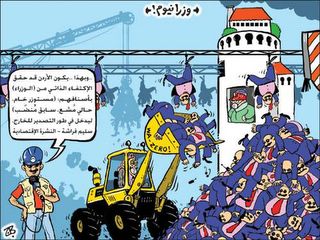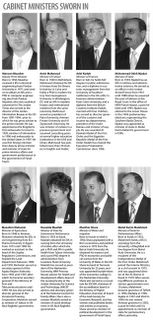
God Help the Arab People......

Jordan's Great Leap Nowhere BY NIBRAS KAZIMI .... any comments from anyone?
Jordan's Great Leap NowhereNibras Kazimi
July 21, 2005 Thursday
The New York Sun
There is a child born every three minutes in Jordan. Someone also dies every 11th minute due to an automobile accident.
Last week, the Jordanian government decided to increase the prices of gasoline and other oil products that are still heavily state-subsidized. In previous years, Saddam Hussein used to supply the Jordanians with almost free oil, even under a U.N.-mandated oil embargo. Every cab driver in Amman, now paying more for gas, is lamenting the demise of Saddam.
Maybe inhibitive gas prices will lead to fewer car crashes, but that is not how the oil hikes are being marketed by the new government. They are part of an all-out plan for economic reform; getting free Iraqi oil is a thing of the past, and the new Jordanian economy must reflect the global realities of a free market. In fact, Jordan is billing itself to the world and specifically to American investors as a model for economic reform in the Middle East.
There is indeed good news in this respect: Jordan has developed its manpower resources by educating a generation toward the fields of technology and services. Things go awry when one realizes that most of this generation expects to find employment in oil-rich Dubai, and not in their own resource-poor country. Apparently, while Jordan is making great strides in getting ready for a globalized free market,
its bureaucracy remains typically Middle Eastern, that is to say, ossified and extremely reluctant to make the sacrifices that go with all-out reform. Under such circumstances, foreign investors are staying out.
Jordan, far from being a model, is a case study that economic reform must go hand in hand with political reform.
But for now, it's all the fault of the Belgians. For some bizarre reason, those who consider themselves "true" Jordanians, that is those who were living within its borders and their descendants before the influx of Palestinian refugees since 1948, have taken to the habit of referring to Jordanians of Palestinian origin as "Belajkeh," or Belgians. There are about 10 different rationalizations for this label and all are equally ridiculous.
One such "Belgian" is Bassem Awadallah, who is the 42-year-old "golden boy" of economic reform. He was born in Jerusalem, and now considers himself a true Jordanian.
However, he has been the lightning rod of non-Belgian Jordanians as the evil-mastermind who is trying to create a Palestinian homeland in Jordan. His reforms, articulated since he was planning minister several years ago, were seen to cater to the more affluent, yet not influential, Jordanians of Palestinian origin, who have the cash to gobble up whatever gets privatized by the government.His true enemies seem to be the 300 families that run Jordan, and who have been making money, and lots of money, from how things used to be run in the past. They include both "true" Jordanians and those of Palestinian origin. They, and their sons and daughters, are the ones recklessly driving all those plentiful luxury cars in Amman, and responsible for quite a number of road tragedies.
Apparently, Mr. Awadallah was dropped from the new Cabinet, where he had been poised to take on the finance portfolio, in order to get the minimal objective of gasoline price hikes done.
Jordan's much-hyped great leap forward has been dwindled down by the political and financial elite into incrementally making the consumer pay for gas that is no longer free.For now, the Jordanian economy is saved from meltdown because of its other marketable commodity: security. With oil prices beyond their wildest imagination and Swiss bank accounts more scrutinized due to worldwide terror, the wealthy of the Gulf states are pouring their petrodollars into grand real estate development projects in Amman. The Jordanian capital is also overrun by Iraq's moneyed classes, who are waiting out the turmoil back home. It is also enjoying the fruits of instability in increasingly bomb-ridden Lebanon by attracting Middle Eastern vacationers. This is yet another lucky wave in a series that has kept Jordan afloat. By the way, security is courtesy of the American taxpayer, arriving in the form of hundreds of millions of dollars in military and intelligence aid every year.
But what happens when all these palliating factors diminish over the near future, and Middle Eastern capital finds more lucrative nearby markets to invest in.
Mr. Awadallah, in a recent chat, says that Jordan needs to speed up economic reform or it will be left behind. However, political reform of the system that brought him personally down cannot be touched, he says, until the larger issue of the Israeli-Arab conflict is resolved and the right of return for Palestinians is tabled. He and most Jordanians of Palestinian origin are likely to stay put, but they will never be accepted by "true" Jordanians as fellow citizens as long as the option of returning to a place called Palestine is not given to them and they can demonstrate, by staying put, that Jordan is their final homeland.
But that is a total cop out. Instead of being at the helm of Jordan's much-needed reform, Mr. Awadallah now holds the grand title of vice chairman of the Abdullah II Fund for Development, which is a skeletally staffed think tank housed in a sleepy Amman side street. The corrupt elite used the outdated politics of xenophobia to divert public attention from his ideas to his "Belgian" background. It was only an excuse to thwart reform, and they are quite adept at finding other excuses along the way.
In the final tally, without a paradigm shift into a new way of handling both political and economic change in Jordan, nothing will get done, and the country will simply ride out one lucky wave onto the next, until the waters settle or a big wave brings everything crashing down.
Jordan has stability and creativity, yet it does not have mobility. Its much-touted economic reform is being peddled by a political class that refuses to reform itself, and in the end it all adds up to nothing really changing, which suits them just fine. The reality, however, is that more Jordanians are being born into a political and economic system that is monopolized by the few and that cannot absorb them, and
if change does not come gradually, then it will come at an even heavier price of turmoil. Maybe America's financial aid should be tied to mobility in the only right direction, forward.

The latest Unpublished Cartoon by Hajjaj - The Jordanian Govt teaches the Yemani Govt on raising prices...

Jordan: Shuffling Forwards BY OXFORD BUSINESS GROUP
Jordan: Shuffling ForwardsOXFORD BUSINESS GROUP
4 July 2005
After several weeks of waiting and speculation, Jordan's new cabinet was finally unveiled on July 3, with eight new ministers appointed. Once again, the fresh line-up is aimed at winning support for economic and political reform, but this time in the face of an increasingly disgruntled parliament. Public opinion, however, appears divided on the new team's chances of delivering.
The reshuffle followed the resignation of the unpopular finance minister, Bassem Awadallah, on June 15. Prime Minister Adnan Badran had also been under attack in parliament, where, according to AFP, a group of some 53 MPs in the 110-seat assembly had mobilised for a no-confidence vote if the government's economic team were not revamped. Awadallah, who had been close to both King Abdullah II and the US, was thus forced out -
a move greeted positively by many ordinary Jordanians, given the rises in oil prices his proposed policy of slashing oil subsidies would have produced - (As if Dr. BAsem wanted to raise the oil prices for no reasons. As if the previous govts haven't been SCREWING all Jordanians by Levying these subsidies and now all of us will pay for it, PAY ALOT.) Faced with unpopular decisions such as plans to raise oil products by 5-12%, the Badran government had to get rid of controversial ministers in order to win public sympathy, a Jordanian official told AFP on July 4.
This was necessary in order to contain the public moaning expected when oil prices will rise. The decision to slash subsidies was given by the prime minister at the end of June, when he told a meeting of private-sector executives in Amman that these would have to go as part of plans to privatise the energy sector by 2008. The figure widely quoted is that $600m of subsidies will be cut over a three-year period. The announcement was also not helped by earlier statements from the government that water bills too would see a hike by the end of the year. Handling such a move requires major political and social consensus, particularly given violent popular responses to similar moves back in 1989 and 1996. A hike in prices of oil and other goods in 2004 did not produce such a backlash, with most analysts seeing the difference as being that in 2004 the move was conducted with parliament onside.
As a result, Badran's new cabinet has been put together with the development of a similar consensus in mind. Two key players in this will be Adel Kodah, the former head of the Privatisation Commission, who takes over Awadallah's post at the Finance Ministry, and Marwan Moasher, a former diplomat, who becomes deputy prime minister and official government spokesman in charge of explaining the reforms to the nation.
Elsewhere, the minister of parliamentary affairs, previously Hisham Tal, is now former Amman governor Abdul Karim Malahmeh. Tal retains his previous second portfolio as deputy prime minister for political development. At the Justice Ministry, the former minister of state for legal affairs, Abed Shakhanbeh, takes over, replacing Mohammed Alawneh. Rowaida Maaitah, a former minister of social development, takes over as minister of government performance, replacing Salah Bashir. Amin Mahmoud becomes minister of culture, while Munther Shara, previously minister of political development, now takes the water and irrigation portfolio, replacing Raed abu Saud -
(Amazing Choice, A Political Science professor to head the Min of Water.)
Mohammad Odeh Njadat, a former minister of state in Abdul Karim Kabariti's government until 1997, returns to the same post. Finally, the former minister of labour and public works, Muzahim Muhaisin, takes over as minister of agriculture, replacing Yousef Shreiqi.
Therefore, the new faces are, with the exception of Malahmeh, not so new. All have served in at least one previous government, which while reassuring in terms of creating an experienced team, does also beg a few questions.
I believe that the deputies will calm down now, local analyst Jamil Nimri told the Jordan Times, but
I don't think that the reshuffle was based on the qualifications of those brought in or on the belief that they could carry out the task ahead. Many see the new appointments as cautious, with the team selected specifically on the basis that they would not upset anyone. They do, however, partly redress a regional disparity that had existed, being largely drawn from the southern and northern regions.
Yet the tactic of non-offence does not seem to have worked entirely, as the resignation of Lower House Deputy Khalil Atiyyeh just before the new government was announced illustrated. One of those deputies who had been a key member of the no-confidence group, Atiyyeh was very popular in his constituency, which is mainly Palestinian refugees in Amman, whom, he said, were being marginalised despite representing a wide section of the Jordanian population.
Other deputies also criticised the new cabinet, with MP Mamdouh Abbadi telling reporters that the prime minister had made his appointments without consulting parliamentarians and that the cabinet lacks the cohesion or makeup of a reformist body. Another worry is the cabinet's stability, as it was only back in April that the last reshuffle took place. The pressing need for continuity in the application of public policy must be respected, editorialised the Jordan Times on July 4.
The country cannot afford a transient government in view of the heavy workload ahead. Most would agree with that - and hope that Prime Minister Badran's team will be up to the challenge.

Wa-zeroanium, The Jordanian Uranium


Ahla Cabinet Reshuffle... Former Min of Political Development is appointed Min of Water... Ahla Hokoma'a

Jordanian PM unveils new Cabinet to gain Parliament's support for reform
Jordanian PM unveils new Cabinet to gain Parliament's support for reformBy Agence France Presse
Monday, July 04, 2005
Jordan Prime Minister Adnan Badran named eight new ministers in a major Cabinet reshuffle aimed at winning a parliamentary vote of confidence - and to gain a mandate for imposing reform and slashing oil subsidies.
In an unprecedented move, Badran was forced to change his line-up only three months after he formed his government in April, as the Cabinet came under attack from a group of 53 MPs in the 110-member Parliament. The deputies threatened a no-confidence vote unless the economic team was changed - in other words the deeply unpopular Finance Minister Bassem Awadallah.
Awadallah, a controversial figure close to King Abdullah II and the U.S. administration, stepped down on June 15, paving the way for the government reshuffle.
"
Faced with unpopular decisions such as plans to raise oil products by five to 12 percent, the Badran government had to get rid of controversial ministers in order to win public sympathy," a Jordanian official said.
"
This was necessary in order to contain the public moaning expected when oil prices will rise," the official said.
Badran, a respected academic-turned-politician, coordinated the reshuffle with Parliament in a bid to win a vote of confidence as well as the support of MPs to forge ahead with economic reform, including plans to slash oil subsidies.
Jordan's King Abdullah II has also met separately with the various political factions to underscore his determination to push for reform and eradicate corruption.
Last week Badran told private sector executives that his government would announce plans to cut oil subsidies as part of a scheme to privatize the energy sector by 2008. Jordan must cut $600 million in subsidies over three years, officials have said.
Price increases for oil products in 1989 and bread in 1996 triggered riots in Jordan, but increases of oil products and other goods in 2004 - which were arranged in close consultation with Parliament - did not fuel any violent discontent in the country.
The newcomers include veteran diplomat Marwan Moasher, who was appointed deputy prime minister, Adel Qudaa, who was named finance minister, and Munzer Shareh, who was handed the Water Ministry. The line-up also includes Muzahem Muhayssen as agriculture minister, Amin Mahmoud for culture, Abdel-Karim Malahmeh as minister of state for parliamentary affairs and Minister of State Mohammad al-Najadat.
A woman, Ruwaida Maayteh, was appointed minister of government performance, joining three other women in the reshuffled Badran government. But the most important measure taken by Badran was to bring back the veteran diplomat Moasher, who was appointed deputy prime minister, a position he held in the former government of Faisal al-Fayez.
Moasher, who has been heading a national committee for reform for several months and served as royal court minister since April, will also act as official government spokesman whose mission will be to explain reform to the nation.
Adel Qudaa, who headed the Privatization Commission since 1996, replaces Awadallah as finance minister in the new government.
The reshuffle, meanwhile, caused its first casualty in Parliament when popular Amman MP Khalil Attiyeh, whose district includes a large Palestinian refugee camp, tendered his resignation, charging that the line-up was not representative.
Attiyeh, who quit Parliament hours before Badran announced the reshuffle, said that
a "large faction of the Jordanian society is being marginalized."





